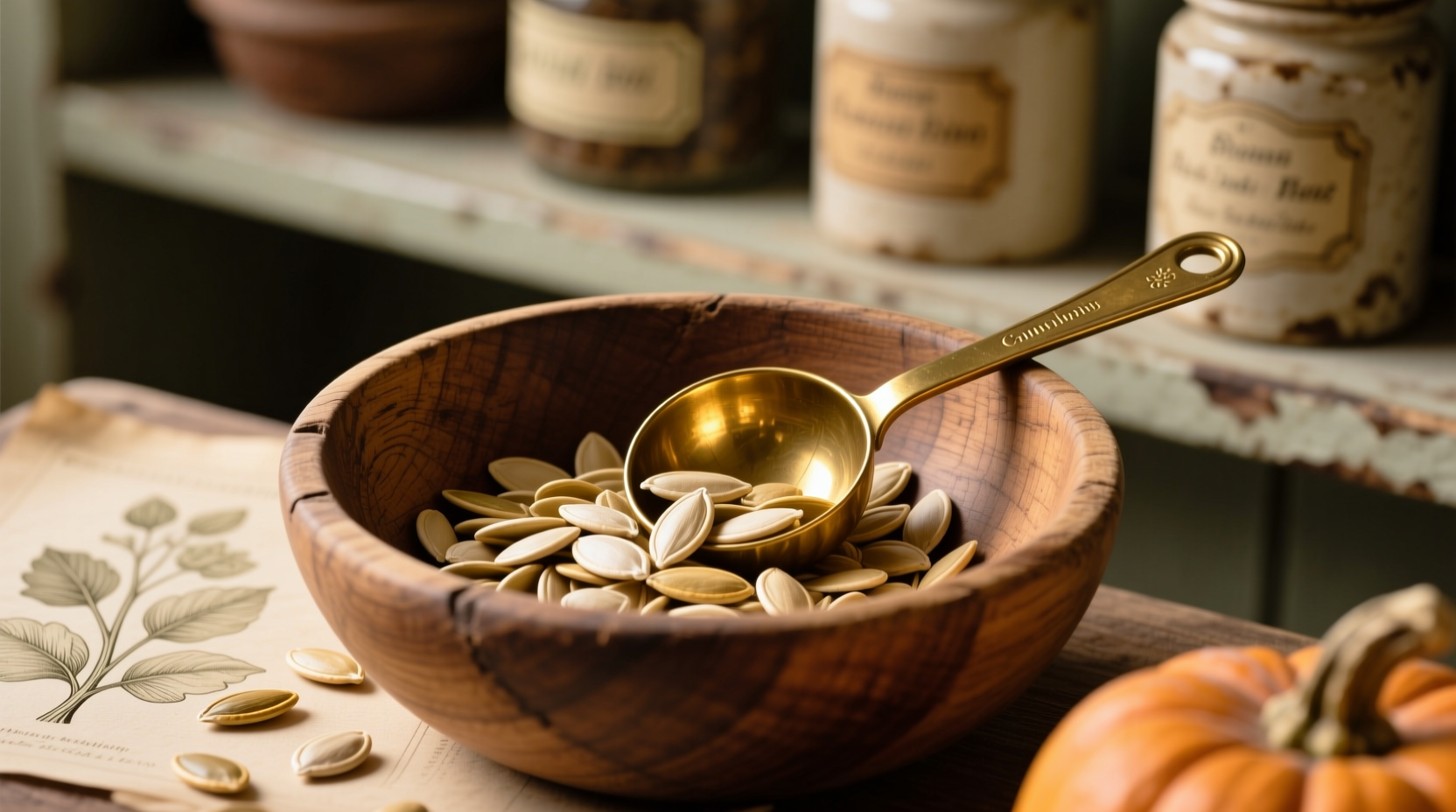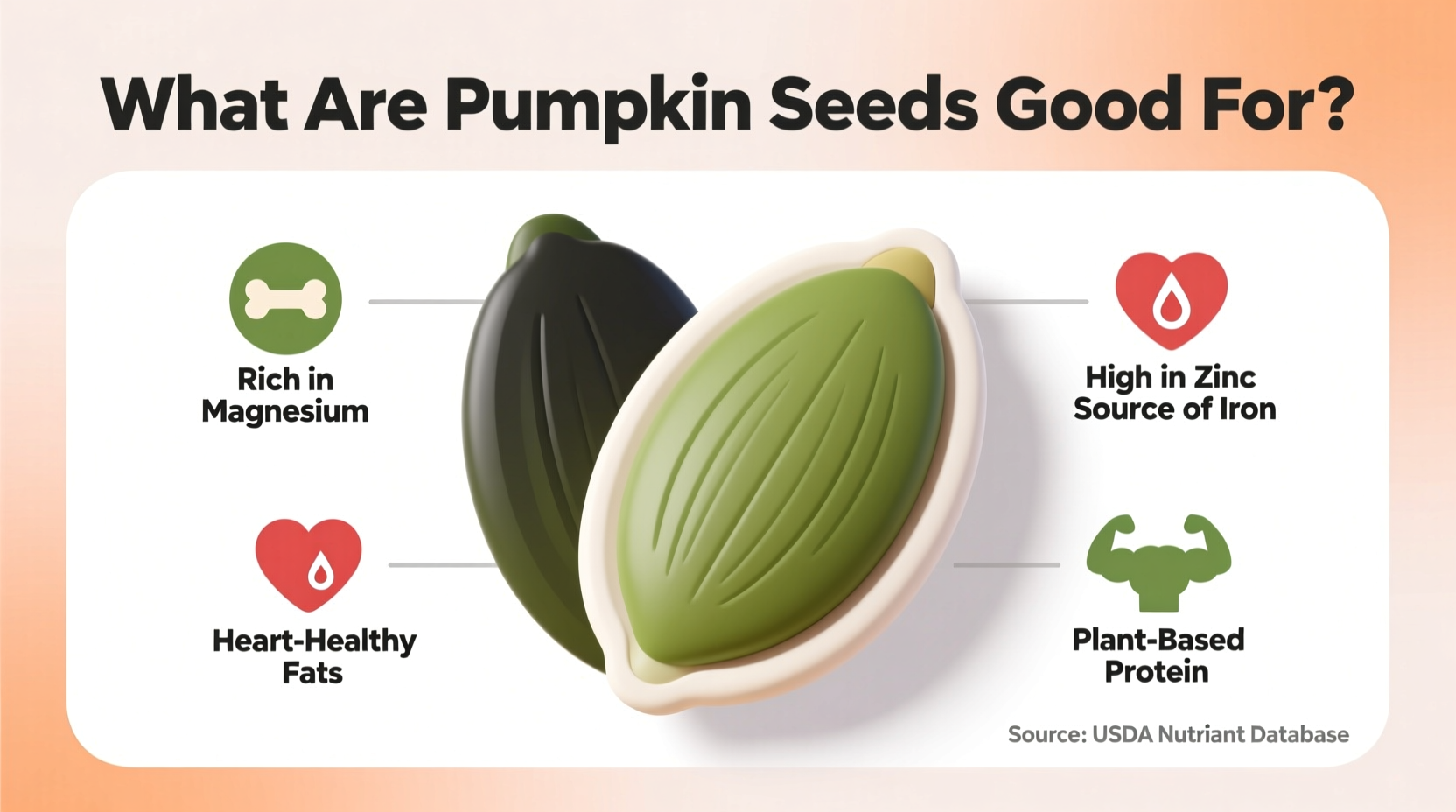The Nutritional Powerhouse in Your Pantry
Often overlooked as mere Halloween byproducts, pumpkin seeds (pepitas) represent one of nature's most concentrated sources of essential nutrients. These small green seeds pack a remarkable nutritional profile that supports multiple aspects of health when incorporated into your regular diet.
| Nutrient | Amount per 1 oz (28g) | Daily Value % | Health Significance |
|---|---|---|---|
| Magnesium | 151 mg | 37% | Supports muscle function, blood sugar regulation, and bone health |
| Zinc | 2.2 mg | 20% | Boosts immune function and prostate health |
| Healthy Fats | 13g | - | Primarily monounsaturated and polyunsaturated fats |
| Plant Protein | 7g | 14% | Complete protein profile with all essential amino acids |
| Fiber | 1.7g | 6% | Promotes digestive health and satiety |
Data sourced from USDA FoodData Central shows that raw pumpkin seeds contain slightly higher nutrient levels compared to roasted varieties, though both provide substantial health benefits. The difference in nutritional value between raw and roasted pumpkin seeds good for health remains minimal when roasted at low temperatures (under 170°F).
Science-Backed Health Benefits of Pumpkin Seeds
Cardiovascular Protection Through Multiple Mechanisms
Research published in the American Journal of Clinical Nutrition demonstrates that regular consumption of pumpkin seeds contributes to heart health through several pathways. Their magnesium content helps regulate blood pressure, while the omega-3 fatty acids (alpha-linolenic acid) reduce inflammation markers. The seeds' phytosterols have been shown to lower LDL cholesterol levels by up to 10% when consumed consistently.
A 12-week clinical trial involving 35 participants with mild hypertension found that those consuming 30g of pumpkin seeds daily experienced significant reductions in both systolic and diastolic blood pressure compared to the control group. This makes pumpkin seeds for heart health an excellent dietary addition for cardiovascular support.
Natural Sleep Enhancement
Pumpkin seeds stand out among plant foods for their high tryptophan content (0.06g per ounce), the amino acid precursor to serotonin and melatonin. According to research from National Center for Complementary and Integrative Health, consuming tryptophan-rich foods like pumpkin seeds approximately 30 minutes before bedtime can improve sleep quality by increasing melatonin production.
The magnesium in pumpkin seeds also plays a crucial role in sleep regulation by activating the parasympathetic nervous system and reducing cortisol levels. This dual-action mechanism explains why pumpkin seeds for better sleep quality have gained attention in sleep research circles.

Blood Sugar Regulation Support
Multiple studies indicate pumpkin seeds may help maintain healthy blood glucose levels. A 2020 review in Nutrients highlighted that the seed's high magnesium content improves insulin sensitivity, while their fiber content slows carbohydrate absorption. In a study of 120 adults with prediabetes, those who consumed pumpkin seed oil supplements showed significantly better glycemic control after eight weeks compared to placebo.
For those exploring natural approaches to blood sugar management, incorporating pumpkin seeds into meals represents a practical dietary strategy. The question of can pumpkin seeds help with blood sugar control receives increasingly positive responses from clinical research.
Prostate and Urinary Health Benefits
Pumpkin seed oil contains compounds called phytosterols that have demonstrated benefits for prostate health. Research from National Institutes of Health indicates that men consuming pumpkin seed oil supplements experienced reduced symptoms of benign prostatic hyperplasia (BPH). The seeds' high zinc content also supports prostate function, as the prostate gland contains more zinc than any other organ.
For women, pumpkin seeds may help reduce symptoms of overactive bladder. A German study found that women taking pumpkin seed extract experienced 79% fewer nighttime bathroom visits after 12 weeks. This makes pumpkin seeds for men's health and women's urinary health a versatile dietary addition.
Practical Incorporation into Your Daily Diet
Optimal Consumption Methods
To maximize the health benefits of eating pumpkin seeds daily, consider these practical approaches:
- Raw consumption: Enjoy 1-2 tablespoons raw as a snack for maximum nutrient retention
- Lightly roasted: Roast at 170°F for 15-20 minutes to preserve nutrients while enhancing flavor
- Seed cycling: Incorporate pumpkin seeds during the follicular phase of menstrual cycles for hormonal balance
- Seed butter: Blend with minimal oil for a nutrient-dense alternative to nut butters
Storage Considerations for Maximum Freshness
Due to their high fat content, pumpkin seeds can become rancid if not stored properly. For optimal shelf life:
- Store in an airtight container in the refrigerator for up to 3 months
- Freeze for up to 1 year with minimal nutrient loss
- Choose seeds with intact shells when possible for longer shelf life
- Avoid exposure to light and heat which accelerate oxidation
Important Considerations and Limitations
Context Boundaries for Consumption
While pumpkin seeds offer numerous health benefits, certain considerations apply:
- Calorie density: At 158 calories per ounce, monitor portions if managing weight
- Phytic acid content: Soaking overnight reduces phytic acid which can inhibit mineral absorption
- Medication interactions: May enhance blood pressure medication effects; consult your doctor if taking antihypertensives
- Allergy considerations: Rare but possible; discontinue use if experiencing itching or swelling
The timeline for experiencing pumpkin seeds health effects varies by benefit: blood pressure improvements may appear within weeks, while prostate health benefits typically require consistent consumption for 8-12 weeks. Understanding these realistic timeframes prevents disappointment with this natural approach to wellness.
Simple Ways to Enjoy Pumpkin Seeds Daily
- Add to morning oatmeal or yogurt for crunch and protein
- Blend into smoothies for added nutrition without altering flavor
- Create homemade trail mix with dried fruit and other seeds
- Use as salad topping instead of croutons for healthier crunch
- Make pumpkin seed pesto as a nut-free alternative to traditional pesto
Frequently Asked Questions
How many pumpkin seeds should I eat daily for health benefits?
Research suggests 1-2 ounces (28-56g) daily provides optimal benefits without excessive calorie intake. This amount delivers sufficient magnesium, zinc, and healthy fats while fitting within balanced dietary patterns. Consuming pumpkin seeds for health benefits works best when incorporated consistently as part of your regular diet rather than sporadically in large quantities.
Are raw or roasted pumpkin seeds more nutritious?
Raw pumpkin seeds retain slightly higher nutrient levels, particularly heat-sensitive compounds like certain antioxidants. However, light roasting below 170°F preserves most nutritional value while enhancing flavor and digestibility. The difference between raw vs roasted pumpkin seeds nutritional value becomes significant only with high-temperature roasting. For maximum benefits, choose raw or gently roasted seeds without added oils or salt.
Can pumpkin seeds help with hair growth?
Emerging research suggests pumpkin seed oil may support hair health. A 2014 study in Phytotherapy Research found men with androgenetic alopecia who took pumpkin seed oil supplements experienced 40% more hair growth after 24 weeks compared to placebo. The seeds' zinc content also supports keratin production, while their fatty acids nourish hair follicles. While not a miracle solution, pumpkin seeds for hair growth represent a promising natural approach worthy of further research.
Do pumpkin seeds have any side effects?
When consumed in typical food amounts, pumpkin seeds rarely cause side effects. However, excessive consumption (more than 4 ounces daily) may lead to digestive discomfort due to high fiber content. Some individuals report headaches from tyramine content, particularly migraine sufferers. The high calorie density requires portion control for weight management. Those taking blood pressure medications should consult their physician as pumpkin seeds may enhance medication effects. These considerations for eating pumpkin seeds ensure safe consumption.











 浙公网安备
33010002000092号
浙公网安备
33010002000092号 浙B2-20120091-4
浙B2-20120091-4